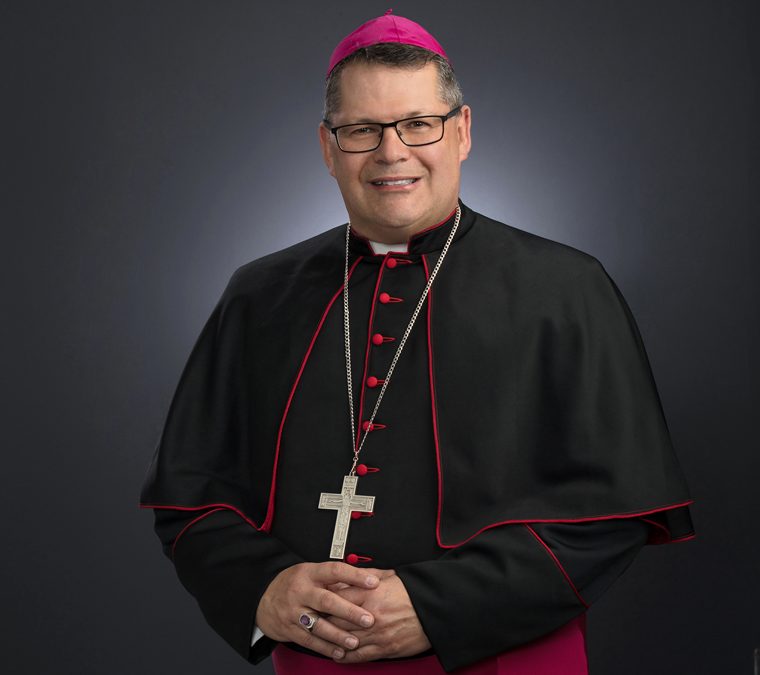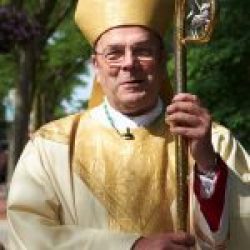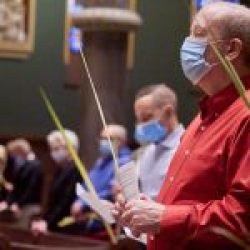In my last column, I spoke of the “universal call to holiness” and said that God has a plan for your life and my life. This plan mirrors the plan of the Son of God become Son of Man whose mission is to lead people back to God through the proclamation of the Good News that “the Kingdom of God is at hand” (see Mt 10:7-8). A powerful sentence I found in my continued reading of Light from Light: A Theological Reflection on the Nicene Creed (Park Ridge, IL: Word on Fire Academic, 2021) by Bishop Barron affirmed: “One might summarize this theology of the cross as follows. The Son of God went to the limits of alienation from God so that even as the worst sinner runs with all her energy away from the Father, she finds herself running into the arms of the Son” (p. 98). The bishop goes on to write: “Having hit rock-bottom, the Son of God finds solidarity with all those human beings who have come to that same awful place” (p. 100).
During this month of November, you and I are invited to ponder “Last Things” and the “End Times”. In common parlance, these things are often referred to in Latin as “memento mori” — “remember death.” Yet, as we do so, such reflection cannot be separated from our belief in the Christ who has “died, risen, and will come again.” God’s openness and solidarity with the human race gives us a new perspective to look at events that can seem dark and foreboding taken alone. What is key is that we are not alone as we face “the last things” in our lives!
As Bishop Barron notes in his theological reflection, the Resurrection has great implications in grounding our faith in life everlasting. The first implication is, “the ratification of Jesus’ daring claim to speak and act in the very person of God” (p. 108). The second maintains that “the Resurrection provided an entirely new interpretative lens for the reading of Jesus’ Crucifixion” (p. 109). In this regard, Bishop Barron writes: “When Jesus appeared alive again to those who had betrayed, denied, and abandoned him at his moment of greatest need, he did indeed show his wounds to remind them of what ‘the world’ had done to him. However, he then uttered not a word of condemnation or recrimination, but rather the word shalom (peace), which sums up the hope of Israel and the intention of God toward his people and toward his entire creation” (p. 109). What a statement as we gaze upon our own woundedness! Not only is there hope of forgiveness, but as Bishop Barron notes: “[T]he Resurrection demonstrated that the sacrifice of the cross had been accepted … that the work of reparation on behalf of the entire human race has been done” (p. 110).
This leads me to the question found in Psalm 116:12 — “What return can I make to the Lord for all that he has done for me?” The psalmist goes on to say: “I will raise the cup of salvation and call on the name of the Lord. I will pay my vows to the Lord in the presence of his people.” These words are a reminder to you and me that God’s call is to each human person made in the image and likeness of God; and that God’s encounter with us through Jesus Christ is an invitation to respond. A basis for that response are our baptismal promises and profession of faith which we renew each Easter. Yet, the congregant’s candle lit from the Easter (Paschal) Candle and held at the moment of renewal signifies for you and me that our profession of faith is not just with our lips, but our lives as well!
How appropriate then that as you and I reflect upon the meaning of Christ’s Passover from death to life, we are asked this week by the Catholic Church in the United States to be aware of our “Vocation” — our “Call from God.” As Catholics, as I stated previously, we firmly believe that God has a plan for our lives! He calls some to marriage, some to the priesthood and others to religious life or to live as generous single people. Fully living our own vocations — and teaching young people how to discern God’s call — is a serious duty, but also a joyful one. This is why during this Vocation Awareness Week, we are given a particular charge to encourage the young people whom we know — children, grandchildren, students and friends — to be open to the call of God in their lives.
In reiterating what we have already said about vocations, Pope St. John Paul II in speaking on this subject states: “Jesus has a specific task in life for each and every one of us. Each one of us is hand-picked, called by name by Jesus! There is no one among us who does not have a divine vocation! Some are called audibly by God, but the usual kind of call is internal, through the inner working of the Spirit.” What an important message for us to hold onto as we approach the penultimate days of the Church’s liturgical. The word “penultimate” means that we are building up to something. What are our lives building up to? Where is our profession of faith leading us?
Let me conclude by sharing with you the story I used this past Sunday — the 32nd Sunday in Ordinary Time — as part of my homily. It is a story of a young man who was sharing his dreams for the future with Fr. Philip. He tells the priest that he is going to go to university to become a lawyer. And so Father responds: “And then what?” Then the young man says he is going to make a lot of money, make a name for himself, buy a nice house, get married and have a family. To which Fr. Philip responds, “And then what?” The young man grows silent — thinks for a moment — then says, “And then I shall die and stand before God?” At that answer, he decided he had to reexamine his priorities!
“And then what?” This is something for all of us to consider during this month. Not just as we focus on Last Things in the Church’s liturgy, but even more in gratitude for all God has done for us. What can you and I do to say thanks for the living, dying and rising of Jesus Christ and all that it means for our lives today and in the future? How can we give witness to those around us that there is still something to wait for? May the days of November be filled with hope and gratitude for you!







